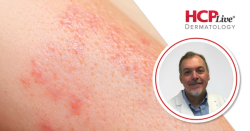
OR WAIT null SECS
Antinephrin Autoantibodies Could Aid in Predicting Disease Activity in Nephrotic Syndrome
Circulating antinephrin autoantibodies identified as reliable biomarkers for MCD and primary FSGS, enhancing diagnostic precision and monitoring of nephrotic syndromes.
A new study could have a significant impact on the diagnosis and management of nephrotic syndromes, with results suggesting circulating antinephrin autoantibodies could help predict disease activity.
Presented at the 61st European Renal Association Congress, results of the study suggest circulating antinephrin autoantibodies were common and appeared to be markers of disease activity in patients with minimal change disease (MCD) and primary focal segmental glomerulosclerosis (FSGS).1
“The identification of antinephrin autoantibodies as a reliable biomarker, coupled with our hybrid immunoprecipitation technique, enhances our diagnostic capabilities and opens new avenues for closely monitoring disease progression in kidney disorders with nephrotic syndrome,” said study investigator Nicola M. Tomas, MD, managing attending in the Department of Medicine III at University Medical Center Hamburg-Eppendorf.2
Despite previous research demonstrating their presence among patients with nephrotic syndrome, evidence gaps exist surrounding the specific clinical and pathophysiological roles. With this in mind, Tomas and colleagues launched the current study to better elucidate their prevalence as well as their associations with disease activity across a multitude of nephrotic syndrome.1
Nephrotic syndromes included in the trial were MCD, FSGS, membranous nephropathy, IgA nephropathy, antineutrophil cytoplasmic antibody (ANCA)–associated glomerulonephritis, lupus nephritis, and children with idiopathic nephrotic syndrome. In total, 539 patients and 117 controls were included in the trial. Of the 539 patients with nephrotic syndrome, 357 were adults and 182 were children.1
Of the 357 adults included in the trial, 105 had MCD, 74 had primary FSGS, 40 had nonprimary FSGS, 50 had membranous nephropathy, 58 had IgA nephropathy, 20 had ANCA-associated glomerulonephritis, and 20 had lupus nephritis.1
Upon analysis of adult patients included in the trial, results suggested antinephrin autoantibodies were found in 44% of those with MCD and9% of those with primary FSGS. In contrast, antinephrin autoantibodies were discovered in 2% or fewer of those with nonprimary FSGS or with membranous nephropathy tested positive for circulating antinephrin autoantibodies. No antinephrin autoantibodies were detected among those with IgA nephropathy, ANCA-associated glomerulonephritis, lupus nephritis, or healthy controls.1
Among children, 52% with idiopathic nephrotic syndrome had detectable antinephrin autoantibodies at the time of sample collection. Investigators noted only 1 of the 50 control children was positive for antinephrin autoantibodies by immunoprecipitation.1
Additional analyses from the trial indicated the prevalence of antinephrin autoantibodies among those with active MCD or idiopathic nephrotic syndrome who were not receiving immunosuppressive treatment were 69% and 90%, respectively. Investigators highlighted antinephrin autoantibody levels were correlated with disease activity at study inclusion and during the follow-up period.1
“By providing insights into underlying mechanisms, these findings lay the groundwork for personalised interventions and pave the way for a new era of precision medicine for these complex conditions,” added study investigator Tobias Huber, MD, chair of the Center of Internal Medicine at the Hamburg Center for Kidney Health, who presented the trial at ERA 24.2
References:
- Hengels FE, Dehde S, Lassé M, et al. Autoantibodies Targeting Nephrin in Podocytopathies. New England Journal of Medicine. Published online May 25, 2024. doi:10.1056/NEJMoa2314471
- European Renal Association. New technique detects novel biomarkers for kidney diseases with nephrotic syndrome. EurekAlert! May 25, 2024. Accessed May 25, 2024. https://www.eurekalert.org/news-releases/1045209.
Related Content:


